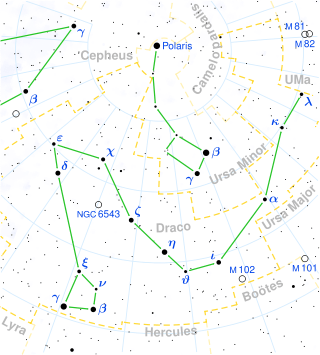Phi Draconis
Phi Draconis (φ Dra / φ Draconis) is a fourth-magnitude variable star in the constellation Draco. It has the Flamsteed designation 43 Draconis. It is also a triple star system where the brightest component is a chemically peculiar Ap star.
 | |
| Observation data Epoch J2000 Equinox J2000 | |
|---|---|
| Constellation | Draco |
| Right ascension | 18h 20m 45.43224s[1] |
| Declination | 71° 20′ 16.1499″[1] |
| Apparent magnitude (V) | 4.2004[1] |
| Characteristics | |
| Spectral type | B8VpSi[2] |
| U−B color index | -0.38[3] |
| B−V color index | -0.10[3] |
| Variable type | α² CVn[4] |
| Astrometry | |
| Radial velocity (Rv) | -16 [5] km/s |
| Proper motion (μ) | RA: -5.03[1] mas/yr Dec.: 37.86[1] mas/yr |
| Parallax (π) | 10.77 ± 0.38[1] mas |
| Distance | 300 ± 10 ly (93 ± 3 pc) |
| Absolute magnitude (MV) | −0.74 (−0.48/+0.94)[6] |
| Orbit[6] | |
| Primary | A |
| Companion | B |
| Period (P) | 307.8 yr |
| Semi-major axis (a) | 0.965" (89.60 au) |
| Eccentricity (e) | 0.752 |
| Inclination (i) | 95.6° |
| Orbit[6] | |
| Primary | Aa |
| Companion | Ab |
| Period (P) | 127.9902 d |
| Eccentricity (e) | 0.707 |
| Inclination (i) | ~50° |
| Semi-amplitude (K1) (primary) | 29.0 km/s |
| Details | |
| Aa | |
| Mass | 3.3[6] M☉ |
| Radius | 2.7 ± 0.2[7] R☉ |
| Luminosity | 107[7] L☉ |
| Surface gravity (log g) | 4.21 ± 0.08[7] cgs |
| Temperature | 11,429[7] K |
| Rotation | 1.71649[7] |
| Age | 245[6] Myr |
| B | |
| Mass | 2.93[6] M☉ |
| Age | 330[6] Myr |
| Other designations | |
| Database references | |
| SIMBAD | data |
The brightness of φ Draconis varies by about 0.04 magnitudes every 1.7 days. This is due to very strong magnetic fields at the surface of the star, and it is classified as an α² Canum Venaticorum variable.[4]
φ Draconis is a multiple star system containing three stars. The inner pair form a single-lined spectroscopic binary in an eccentric 128-day orbit. The outer star orbits the inner pair every 308 years. The outer pair can be resolved visually and have a semi-major axis of 0.752″.[6]
φ Draconis Aa is a main sequence Ap star with a spectral class of B8. The main abundance excess is silicon, although iron and chromium and also notably elevated.[8]
In Chinese astronomy, Phi Draconis is called 柱史, Pinyin: Zhùshǐ, meaning Official of Royal Archives, because this star is marking itself and stand alone in Official of Royal Archives asterism, Purple Forbidden enclosure (see : Chinese constellation).[9]
References
- van Leeuwen, F. (November 2007). "Hipparcos, the New Reduction" (VizieR). Astronomy and Astrophysics. 474 (2): 653–664. arXiv:0708.1752. Bibcode:2007A&A...474..653V. doi:10.1051/0004-6361:20078357. Retrieved 2010-11-22.
- Gray, R. O.; Corbally, C. J. (2014). "An Expert Computer Program for Classifying Stars on the MK Spectral Classification System". The Astronomical Journal. 147 (4): 80. Bibcode:2014AJ....147...80G. doi:10.1088/0004-6256/147/4/80.
- Mermilliod, J.-C. (1986). "Compilation of Eggen's UBV data, transformed to UBV (unpublished)". Catalogue of Eggen's UBV Data. (PDF) origin: SIMBAD: 0. Bibcode:1986EgUBV........0M.
- Samus, N. N.; Durlevich, O. V.; et al. (2009). "VizieR Online Data Catalog: General Catalogue of Variable Stars (Samus+ 2007-2013)". VizieR On-line Data Catalog: B/gcvs. Originally Published in: 2009yCat....102025S. 1. Bibcode:2009yCat....102025S.
- Evans, D. S. (1967). "The Revision of the General Catalogue of Radial Velocities". Determination of Radial Velocities and Their Applications. 30: 57. Bibcode:1967IAUS...30...57E.
- Liška, J. (2016). "Analysis of the multiple system with chemically peculiar component φ Draconis". Monthly Notices of the Royal Astronomical Society. 461 (1): 939. Bibcode:2016MNRAS.461..939L. doi:10.1093/mnras/stw1355.
- North, P. (June 1998), "Do SI stars undergo any rotational braking?", Astronomy and Astrophysics, 334: 181–187, arXiv:astro-ph/9802286, Bibcode:1998A&A...334..181N
- Prvák, M.; Liška, J.; Krtička, J.; Mikulášek, Z.; Lüftinger, T. (2015). "Modelling of variability of the chemically peculiar star ϕ Draconis". Astronomy and Astrophysics. 584: A17. Bibcode:2015A&A...584A..17P. doi:10.1051/0004-6361/201526647.
- (in Chinese) AEEA (Activities of Exhibition and Education in Astronomy) 天文教育資訊網 2006 年 6 月 10 日
External links
- Jim Kaler's Stars, University of Illinois: PHI DRA (Phi Draconis)
- An Atlas of the Universe: Multiple Star Orbits